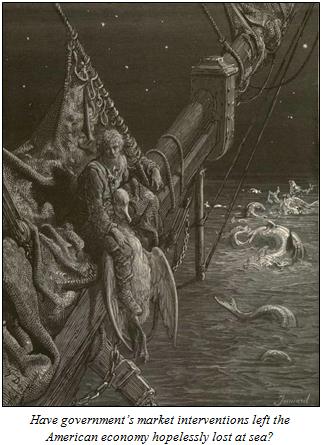“And I had done an hellish thing,
“And it would work ’em woe :
“For all averred, I had killed the bird
“That made the breeze to blow.
“Ah wretch ! said they, the bird to slay,
“That made the breeze to blow !”
—The mariner who shot the American
ship of state’s good luck: the free market.

Things may be turning around for the automaker, and it may be because they did not take the bailout from the Troubled Asset Relief Program (TARP). As reported by Advertising Age’s Jean Halliday, as of January Ford has increased its market share for four consecutive months over its American competitors. GM and Chrysler, who both have opted for $17 billion in government funding, are still faltering, as reported by Bloomberg. And they appeared all but poised to come back for yet more tax-funded bailouts.
It is no wonder. The markets can smell fear, they build weakness into the price, and they are not rewarding GM and Chrysler for begging the American people for subsidies. Now, with Ford gaining market momentum, it is obvious that traditional market forces remain at play despite government interventionism. Ford’s entrepreneurial courage to ride out the storm—even, and perhaps especially when times are hard—is being rewarded.
And then, yesterday, GM announced that it would not be coming back to Uncle Sam for more bailout funds. Before the salons announce that the bailout “worked,” consider this: They made said announcement to compete with Ford, who never took the bailout and is increasing market share. Upon the announcement, shares soared 11 percent. The true narrative is that the bailout has been a disaster for any who touch the money and have an Albatross hung around their neck for killing the free market.
There are lessons to be learned here. And really, they are the lessons most people in a free society learn growing up. The market is the school of hard knocks. Hard work, dedication, and persistence are rewarded. Sloth is punished.
So, for companies looking for a handout from government: “bailout beware!” To do so may be to risk being viewed as weak and unprofitable by the marketplace, the fate now appearing to have befallen GM, Chrysler, AIG, and others who turned—and then turn again—to the taxpayer trough for capital.
In truth, investor and marketplace confidence has been severely shaken by the steady stream of bailouts by government starting on March 16th, 2008, when the Federal Reserve gave $29 billion in loans to JP Morgan to purchase Bear Stearns at $2 share. On March 17th, at the close of trading, JP Morgan stood at $40.31. As of this writing, almost exactly one year later, it stands at $23 a share. So much for the sagacity of socialism run amok.
Proponents argue that the institutions given aid are “too big to fail,” and therefore pose a “systemic” risk to the broader economy. They insist that the costs of not bailing out these firms are greater than the costs of action. In fact, the greatest price has been paid by the greater economy of investors who do not know if it is safe to invest, producers to produce, consumers to consume, and sellers to sell. As it now stands, nobody can be certain success carries rewards, and that failure bears risks. Because market forces are not being allowed—by government—to be applied.
Failures, for example, in the housing market have become de facto lines on the federal budget and lending programs, as Congress, along with the Department of Treasury and Federal Reserve, have agreed to essentially cover everyone’s losses. To date, that means trillions of dollars in tax losses—paid with interest, since most of the money is borrowed from overseas and elsewhere.
And so far, the American people are still fed the Obama-Geithner line that mortgage-backed securities cannot be valued of their own accord, that they are “toxifying” balance sheets, and must therefore be purchased by the Treasury, the Fed, and Congress. Or else.
FDIC has gotten into the act, too, when Congress raised insurance premiums of $250,000 per account instead of just $100,000. It has expanded its assurances by over $2 trillion. The American people are told that these moves were intended to “bolster” confidence in deposits. They too now teeter on the brink.
To be sure, this is a confidence game.
To those with a trained eye, cons are conspicuous. But government moves tell investors, depositors, and other market participants certain things about market conditions. And by moving too heavily into those markets, government sends a very clear signal: Things are bad right now. To a potential investor, that means don’t invest more, or sell. To depositors, that means don’t deposit more, or close the current accounts. After all, a government that has run up an $11 trillion national debt doesn’t exactly inspire legitimate confidence.
So, for bailout proponents who choose to finger point bailout naysayers as “spooking” the market, look at the case of Ford. They are weathering the storm. They may make it. They may not. They may ultimately turn to the government for aid.
But when all the winds were pointing towards the eye of the storm, where the waves temporarily may subside, they steered into the waves and sought to brave them. It was a genuine moment. An American moment.
And it upholds an idea completely alien to bailout-prone politicians, who try to turn every crisis into an opportunity to cultivate a new constituency and enact a socialist agenda. The American people increasingly view these as transparent attempts by Congressmen merely giving handouts to favored interest groups and campaign donors. They will not get away with it—no matter how they try to make the free market an Albatross.
Robert Romano is the Senior Editor of ALG News Bureau.

